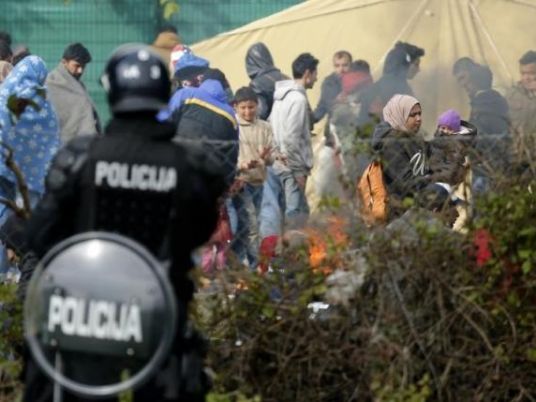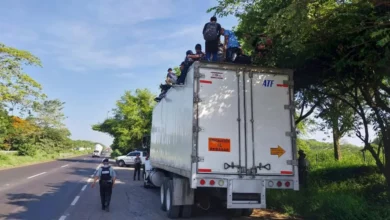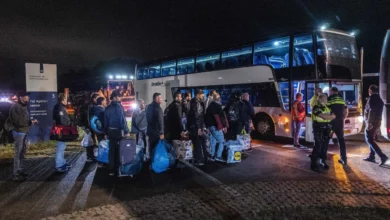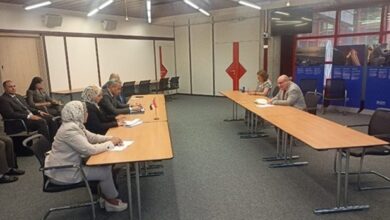
About 3,500 migrants spent the night camped out in freezing cold at the Berkasovo-Bapska border crossing between Serbia and Croatia after the Croatian government closed the gates to limit the number of people entering the country.
At first light on Thursday, groups of refugees bypassed the official border crossing and walked through orchards into Croatia.
"Babies crying, women crying, we were burning big fires, but it was very cold, no one gave us food, only some bread," said a man named Sayed, who had made it to the border from the Syrian capital of Damascus.
The crossing is one of the new focal points of Europe's biggest refugee and migrant crisis since World War II, which has seen hundreds of thousands of people fleeing war and poverty in the Middle East and Africa this year to try to reach Europe's rich countries.
Hungary sealed its border with Croatia last week, blocking entry with a metal fence and razor wire. Croatia began directing migrants west to Slovenia, which has tried to stem the flow as migrants sought new routes and human bottlenecks built up through the Balkans.
Most want to continue their journey on to Austria and Germany, the preferred destination for most. Both Slovenia and Hungary are part of Europe's passport-free Schengen Area while Croatia is not.
With many now trapped in deteriorating conditions in the Balkans, European Commission President Jean-Claude Juncker called an extraordinary meeting of several European leaders to take place on Sunday.
The commission said in a statement on Wednesday that Juncker had invited the leaders of Austria, Bulgaria, Croatia, the former Yugoslav Republic of Macedonia, Germany, Greece, Hungary, Romania, Serbia and Slovenia.
"In view of the unfolding emergency in the countries along the Western Balkans migratory route, there is a need for much greater cooperation, more extensive consultation and immediate operational action," the commission said.
More than 20,000 migrants have arrived in Slovenia since Saturday morning in order to pass through to Austria.
The Slovenian parliament passed legislation on Wednesday that will give the army more power to help police guarding the state border.
Prime Minister Miro Cerar told reporters before the vote in parliament that Slovenia would ask the European Union for police reinforcements and for financial help
The heads of the police and border forces of Austria, Slovenia, Croatia and Hungary were due meet in Vienna on Wednesday.
Hungry and cold
Aid agencies are concerned about backlogs of migrants building in the Balkans, battered by autumn winds and rain as temperatures drop before winter.
Croatian authorities said about 4,200 people were sheltered in the Opatovac camp, from where buses would take them directly to the Slovenian border straight or to the nearest train station in Tovarnik, from where they could go to Slovenia border. The camp capacity is 4,000 people.
Refugees who spent the night at the Berkasovo-Bapska border crossing in tents or under tarpaulins provided by aid groups burned bonfires to warm themselves up.
"The keyword is – cold. It's been freezing, this was our busiest night this week," said Astrid Coyne-Jensen of the Danish People's Aid medical team.
Mustafa, a man in his 30s, wrapped in a gray blanket said that his group of three families spent the night at the border crossing under a piece of discarded tarpaulin as there were not enough tents for everyone.
"I am from Hama in Syria, I have family in Turkey, I will tell them not to come as this is not for people, this is for animals," Mustafa said as he was trying to break a piece of wood to put it in a fire.
Slovenian opposition parties said the government should follow Hungary and put up a fence on its border with Croatia to prevent migrants entering the country. An Interior Ministry official said the possibility erecting obstacles could not be excluded if the flow of migrants escalated.
Almost 6,000 migrants arrived on the Greek mainland on Wednesday on three ferry boats sailing from the islands of Lesbos and Chios, the first pount of landfall for many of the refugees from Syria. They disembarked at Pireaus port where they were bussed out to a central train station.
Two boatloads of migrants came ashore at a British military base on Cyprus on Wednesday, authorities said, the first time since the crisis began that refugees have landed directly on what is considered British sovereign soil.
Vessels carrying the migrants were spotted in the early morning hours off RAF Akrotiri. They held about 140 people, including women and children.




